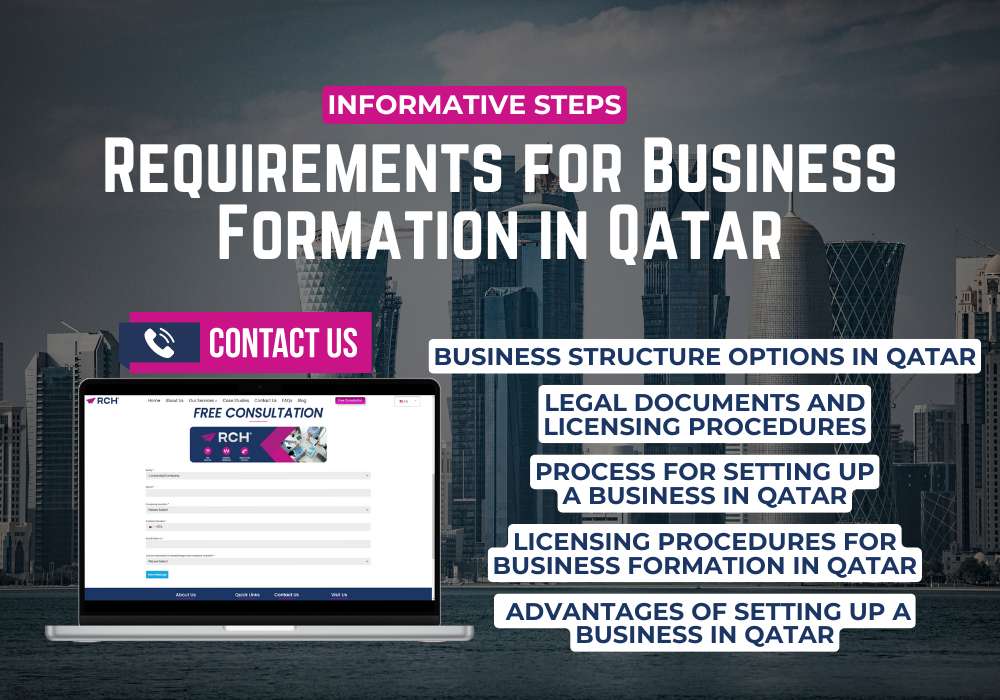Starting a business in Qatar can be a rewarding venture, but it requires a thorough understanding of the local legal landscape. Business formation in Qatar involves navigating various legal requirements and choosing the right business structure that aligns with your goals. From limited liability companies (LLCs) to sole proprietorships, understanding your options is crucial. You will also need to gather essential legal documents and complete licensing procedures to ensure your business is compliant with Qatari regulations.
To help you through this process, we provide a step-by-step guide on setting up a business in Qatar. This includes selecting an appropriate location, registering your business with the necessary authorities, opening a corporate bank account, and hiring employees. Each step is designed to simplify your journey and ensure you are fully prepared to establish and grow your business in Qatar. Following this guide will equip you with the knowledge and tools needed for successful business formation in Qatar.
1. Understanding Legal Requirements for Business Formation in Qatar
Overview of Business Structure Options in Qatar
When considering business formation in Qatar, it’s essential to understand the various types of business structures available. Each structure has its advantages, obligations, and legal requirements. Below are the primary business structure options in Qatar:
- Limited Liability Company (LLC): This is the most common form of business entity in Qatar. An LLC requires at least two and up to fifty shareholders. The liability of shareholders is limited to their share in the company’s capital.
- Sole Proprietorship: This is a business owned by a single individual. The owner is personally liable for all obligations and debts of the business. It is simpler to set up but involves higher personal risk.
- Partnership: This involves two or more individuals sharing ownership. There are different types of partnerships, such as general partnerships and limited partnerships, each with distinct levels of liability and involvement.
- Branch Office: Foreign companies can open a branch office in Qatar. This branch operates as an extension of the parent company and is subject to certain regulations to ensure it complies with local laws.
- Representative Office: This type of business is primarily used for marketing or administrative activities. It cannot engage in direct commercial activities or generate revenue.
- Free Zone Entity: Businesses can also establish entities in one of Qatar’s free zones, such as the Qatar Free Zones Authority (QFZA). These zones offer numerous benefits, including 100% foreign ownership and tax exemptions.
Essential Legal Documents and Licensing Procedures
Once you’ve chosen the appropriate business structure, the next step in business formation in Qatar involves compiling essential legal documents and following the necessary licensing procedures. Here’s a breakdown of what you typically need:
- Commercial Registration (CR):
All businesses in Qatar must obtain a Commercial Registration (CR) from the Ministry of Commerce and Industry (MOCI). This document serves as the primary registration for your business entity and is mandatory for all types of businesses.
- Trade License:
A Trade License, also issued by MOCI, licensing for your business permits to carry out commercial activities. It is crucial for ensuring that your business complies with local laws and regulations.
- Municipality License:
This license is issued by the municipality where your business will operate. It confirms that your business premises meet all the local zoning and safety regulations. Essentially, it verifies that your location is suitable for the type of business activities you intend to conduct.
- Tax Identification Number (TIN):
Businesses must register with the Qatar Tax Department to obtain a Tax Identification Number (TIN). This number is essential for tax filings and compliance with the country’s tax laws.
- Articles of Association (AOA):
This document outlines the structure and purpose of the company, including details such as the business name, objectives, capital distribution, and shareholder responsibilities. The AOA must be notarized and submitted to relevant authorities.
- Shareholders’ Agreements:
For LLCs and partnerships, a Shareholders’ Agreement is essential. This agreement delineates the rights and responsibilities of each shareholder, the decision-making process, and procedures for resolving disputes.
- Special Permits and Licenses:
Depending on the nature of your business activity, you may need additional licensing for your business permits or licenses. For instance, healthcare establishments, educational institutions, and financial services require special approval from their respective regulatory bodies.
Requirements Licensing Procedures for Business Formation in Qatar
Here is a simplified step-by-step guide for obtaining the necessary licenses and documentation for business formation in Qatar:
- Select the appropriate business structure and compile the required documents and agreements, such as the Articles of Association (AOA) and Shareholders’ Agreements.
- Submit an application to the Ministry of Commerce and Industry for the Commercial Registration (CR). Ensure that all required details and documents are included to avoid delays.
- Obtain a Trade License from MOCI. This step typically involves submitting additional details about the business activities and ensuring compliance with specific regulatory requirements.
- Apply for a Municipality License from the local municipal office where your business premises are located. Ensure your premises meet all zoning and safety regulations.
- Register your business with the Qatar Tax Department to get your Tax Identification Number (TIN), which is crucial for tax filings and compliance.
Following these detailed steps will help ensure that your business formation process in Qatar is seamless and legally compliant, paving the way for a successful venture in this thriving market.
Start your business in Qatar now!

Step-by-Step Process for Setting Up a Business in Qatar
Choosing a Suitable Location and Registering Your Business
When it comes to business formation in Qatar, one of the first critical steps is selecting the right location and completing the registration process. Qatar offers various free zones and mainland options for businesses, each with its own set of advantages.
Choosing a Suitable Location
- Free Zones: Free zones such as Qatar Science and Technology Park (QSTP) and Qatar Financial Center (QFC) offer benefits like 100% foreign ownership, tax exemptions, and simplified incorporation procedures.
- Mainland: Businesses established on the mainland must comply with local regulations, which often require a Qatari partner holding 51% of the company shares. However, mainland businesses can operate freely within Qatar and engage in more diverse sectors.
- Special Economic Zones: Areas like Ras Bufontas, Umm Alhoul, and Al Karaana offer specific benefits tailored to certain industries like manufacturing, logistics, and technology.
Business Registration Process
- Trade Name Reservation: Submit an application to the Ministry of Commerce and Industry (MOCI) to reserve a unique trade name for your business.
- Articles of Association: Draft and notarize the Articles of Association (AOA), which outlines the structure and operational guidelines of your company.
- Commercial Registration: Register your business with the MOCI by submitting the necessary documentation, such as your AOA, trade name reservation, and shareholder details.
- Municipal License: Obtain the requisite municipal license, which involves inspections and approval from local authorities to ensure your business location meets regulatory standards.
- Tax Identification: Register for tax duties at the General Tax Authority. Depending on your business structure, you may need to obtain a tax identification number (TIN).
- Qatar Chamber Registration: Register your business with the Qatar Chamber to comply with local business networking and regulatory requirements.
Opening a Corporate Bank Account and Hiring Employees
Another crucial step in the business formation process in Qatar is to set up financial and HR systems. Establishing a corporate bank account and hiring skilled employees are foundational steps for operational readiness.
Opening a Corporate Bank Account
- Choose a Bank: Select a reputable bank in Qatar that offers corporate banking services. Some popular options include Qatar National Bank (QNB), Doha Bank, and Commercial Bank of Qatar.
- Gather Documentation: Prepare all necessary documents, such as your business registration certificate, Articles of Association, and identification documents for company representatives.
- Application Submission: Submit your application along with the required documents to the selected bank. Ensure that all information is accurate to avoid delays.
- Account Approval: The bank will review your application and conduct due diligence. Upon approval, your corporate bank account will be activated, allowing you to manage finances efficiently.
Hiring Employees
- Obtain Work Visas: Apply for work visas for your foreign employees through the Ministry of Administrative Development, Labour & Social Affairs. Ensure compliance with Qatar’s labor laws.
- Recruitment: Utilize local recruitment agencies, job portals, or fairs to find suitable candidates for various positions in your company.
- Employment Contracts: Draft and sign employment contracts that outline job roles, responsibilities, compensation, and other terms of employment.
- Onboarding: Implement a comprehensive onboarding process to acclimate new hires to your business practices, culture, and expectations.
By following these detailed steps for business formation in Qatar, entrepreneurs can effectively establish their companies while ensuring compliance with local regulations. Whether choosing a suitable location, registering your business, opening a corporate bank account, or hiring employees, each phase is essential for successful business operations in this burgeoning market.
Key Advantages of Setting Up a Business in Qatar
- Strategic Location: Qatar’s geographical position makes it a central hub for trade between the East and West, providing easy access to global and regional markets.
- Tax Benefits: With attractive tax incentives, including exemptions in free zones, businesses can maximize profitability and reinvest in growth opportunities.
- Economic Stability: Qatar’s strong economic performance and wealth from natural resources offer a stable environment for business operations.
- Advanced Infrastructure: World-class infrastructure, including transportation, logistics, and communication networks, ensures seamless business operations.
- Government Support: Pro-business government policies and initiatives actively support entrepreneurship and business growth, facilitating ease of doing business.
The strategic advantages of business formation in Qatar create a compelling case for entrepreneurs and investors looking to establish and expand their operations in the region, offering a dynamic business climate and substantial growth opportunities.
In conclusion, business formation in Qatar involves a comprehensive understanding of its legal requirements and a methodical approach to setting up operations. By familiarizing yourself with the various business structure options available, such as Limited Liability Company (LLC), Branch Office, or Representative Office, you can choose the one that best fits your needs. Ensuring that you gather all necessary legal documents and complete the required licensing procedures is crucial for a smooth initiation.






